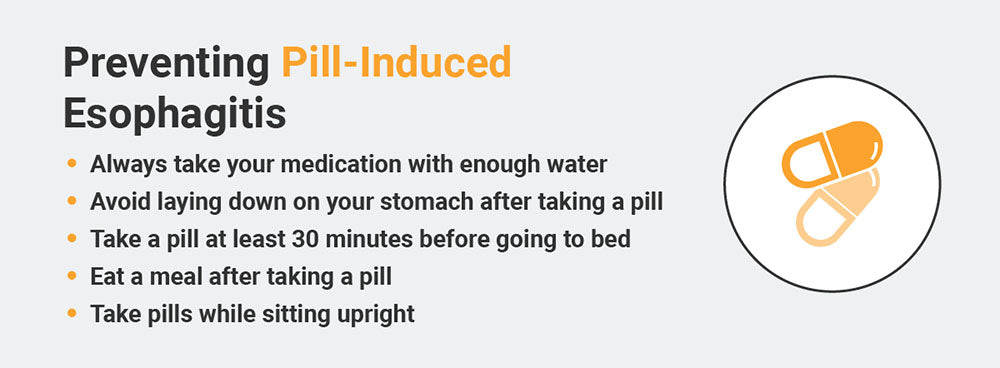Your Cart is Empty
Get €20 Off by subscribing to newsletter!
MedCline Gift card : offer from 50€ to 300€!
Get €20 Off by subscribing to newsletter!
MedCline Gift card : offer from 50€ to 300€!

What is Pill Induced Esophagitis?
Pill-Induced Esophagitis: Symptoms and Treatments
We’re all familiar with taking pills. Whether you’re taking a pill to quell a headache or to treat a more serious health condition- we’ve all been through the actions of swallowing a pill. But pills come in all different shapes and sizes, and some can be more difficult than others to get down, especially if you find yourself with a pounding headache and no water to wash down the painkiller.
Getting a pill stuck in your throat is one of the most uncomfortable feelings. It seems like no matter how much water you drink, you just can’t shake the feeling of something being wedged in your esophagus. But I bet you didn’t know that there’s an actual term for this situation: pill-induced esophagitis. Pill-induced esophagitis can be a serious condition if it’s not treated properly. In this article, we’ll discuss what pill-induced esophagitis is, medicines that may cause it, symptoms, treatment, and more. So if you ever find yourself in that uncomfortable situation with a pill stuck in your throat, you’ll know exactly what to do.
- What is Pill-Induced Esophagitis?
- Medicines That May Cause Pill-Induced Esophagitis
- Symptoms
- Treatment
- Pill-Induced Esophagitis Prevention
What is Pill-Induced Esophagitis?
How many pills have you taken over the last month, week, or even today? Taking a single pill of say Advil ® or aspirin can put you at risk for esophagitis, referred to as pill-induced esophagitis. This inflammation of the esophagus can happen if the pill doesn’t go down your throat quickly. Prolonged contact with the mucosal lining of your esophagus can result in inflammation, esophageal strictures, or in extreme cases hemorrhages, requiring immediate medical attention.

Medicines That May Cause Pill-Induced Esophagitis
There are certain medications that can put you at an increased risk of pill-induced esophagitis. It’s crucial to be aware of these medications so you know to take the proper steps to prevent this from happening. There have been reports of more than 30 different types of medication that have caused drug-induced esophagitis. While any type of pill can hypothetically cause this, there are certain medications that have been more likely in the past. These are the common medicines that may cause pill-induced esophagitis:
- Antibiotics: one of the most common medications, especially doxycycline. Clindamycin, amoxicillin, metronidazole, ciprofloxacin, and rifaximin are also common.
- NSAIDs (nonsteroidal anti-inflammatories)
- Aspirin
- Advil ®
- Motrin®
- Aleve ®
- Prescription-strength pain relievers
- Alendronate (Fosamax ®, Merck)
- Potassium chloride
- Quinidine
- Warfarin
- Acetaminophen
- Thoracic irradiation
Symptoms
Those who develop pill-induced esophagitis typically take a pill with a small amount or water and/or take a pill right before going to bed. Within a couple hours, they can develop pill-induced esophagitis, characterized by symptoms such as:
- Difficult swallowing
- Painful swallowing
- Chest pain, particularly behind the breastbone, that occurs with eating
- Swallowed food becoming stuck in the esophagus (food impaction)
- Heartburn
- Acid regurgitation
Pill esophagitis symptoms can occur anywhere from a couple of hours to up to 10 days after taking the pill. Chest pain and other pill-induced esophagitis symptoms may be continuous and are often exacerbated by swallowing. Painful swallowing (odynophagia) or difficulty swallowing (dysphagia) can last a few days and can get better gradually. In more severe cases, patients may not be able to eat for a period of time. Severe cases are complicated by stenosis, strictures, hemorrhage, or even perforation.

It’s also important to be aware of pill-induced esophagitis in children. Pill esophagitis symptoms in children include:
- Pain while swallowing food or liquids
- Retrosternal pain
- Failure to thrive
Treatment
The first step in pill esophagitis treatment is diagnosis. If you’re experiencing any of the above symptoms, make sure to see your doctor as soon as possible. Your doctor will likely make a diagnosis based on one of the following tests:
- Barium X-Ray: For this test, you’ll either drink a solution containing barium or take a pill that’s coated in barium. Barium helps to make the organs visible by coating the lining of the esophagus and stomach. This will help your doctor to be able to see where the issue is coming from so they can provide proper treatment.
- Endoscopy: Your doctor will insert a long, thin tube with a camera into your throat and to your esophagus. With this, your doctor will be able to see if there is anything stuck in the esophagus or if there are any abnormalities.
- Lab tests: Your doctor will remove a small tissue sample and send it to the lab for testing which can be used to diagnose various infections.
Once you have been diagnosed with drug induced esophagitis by your doctor, they will likely suggest a course of treatment. There are various treatments for drug-induced esophagitis. It’s important to take the proper steps to treat pill induced esophagitis so that you can stop any symptoms before they evolve into something more serious. These are a few treatments that can provide pill esophagitis relief:
- Discontinue the drug: If possible, stop taking the medication and change to a liquid form, if that is an option
- Oral sucralfate: This creates a protective barrier and has cytoprotective effects
- Topical medication: If symptoms persist, patients can use lidocaine to alleviate discomfort
- Parental nutrition: Can be used in cases where a patient has difficulty swallowing, but it’s not common
- Avoid extremely hot, cold, or acidic foods that can worse symptoms
Those who develop strictures or other serious complications as a result of pill-induced esophagitis can develop long-term symptoms of gastroesophageal reflux disease (GERD). In these cases, proton pump inhibitor (PPI) medications are often prescribed to treat acid reflux symptoms. However, PPI medications do not come without their own risks, which further complicates the treatment path.
PPIs Have Other Risks
Several FDA warnings have been issued and hundreds of studies published showing an association between long term PPI usage with hip, wrist or spine fractures; bacterial infections; chronic kidney disease; heart disease; dementia; community-acquired pneumonia; stomach cancer; chronic liver disease; and even premature death.

Pill-Induced Esophagitis Prevention
Although there are various treatments for drug-induced esophagitis, the best treatment is always prevention. Taking the proper measures to swallow your pills correctly can prevent this situation from happening all together, which is always the best case scenario. Here are a few ways to prevent pill-induced esophagitis:
- Always take your medication with enough water
- Take a pill with at least 200 to 250 ml of water
- Avoid laying down on your stomach after taking a pill
- The prone position makes it more likely that a pill will get stuck in your esophagus
- Take a pill at least 30 minutes before going to bed
- You produce less saliva and swallow less while you sleep, making it more likely that a pill can get stuck
- Eat a meal after taking a pill
- Food can help you swallow and digest the medication
- Take pills while sitting upright
- So the pill can travel through the esophagus more easily
If you are experiencing symptoms related to GERD and acid reflux, MedCline offers a variety of products that can reduce acid exposure and minimize symptoms, including the Reflux Relief System. Many things can cause acid reflux, but these are some of the most common acid reflux triggers: diet, sleeping posture, stress, stomach abnormalities, pregnancy, and smoking. Acid reflux is painful and frustrating to deal with, so it’s important to take measures to prevent it. Here is how to prevent acid reflux from happening:
- Maintain a healthy lifestyle: Stay active and eat healthy to keep pressure off your stomach and reduce the chances of developing GERD
- Don’t eat too close to bedtime: Lying down after eating can trigger acid reflux, so try to eat at least three hours before going to sleep so you can properly digest your meal
- Eat at a slow pace: Eating quickly can increase the chance that you’ll overeat, which can cause your stomach’s acidic contents to go to your esophagus
- Sleep at an elevated angle: Elevate the upper part of your body while you sleep so that you can prevent acid reflux at night
MedCline also offers an acid reflux and esophagus relief system that is helpful to relieve acid reflux symptoms. The MedCline reflux relief system is a pillow that helps with nighttime acid reflux by keeping your torso elevated comfortably throughout the night. The pillow is made with gel-infused foam and eliminates the need to stack pillows to get comfortable. It is a great alternative to acid reflux medication and provides protection from harmful acid.
Pill-induced esophagitis is not something to be taken lightly. It can have serious consequences if it is not treated properly, so if you’re experiencing any difficulty swallowing, chest pain, heartburn, or acid reflux after taking a pill, see your doctor as soon as possible. It’s best to treat drug induced esophagitis as quickly as possible so you can prevent it from progressing into something more serious. And remember: prevention is the best treatment. Always be sure to take your pills standing up and with lots of water. Taking pills is something we all have to do from time to time, so you want to make sure you’re doing it right.



